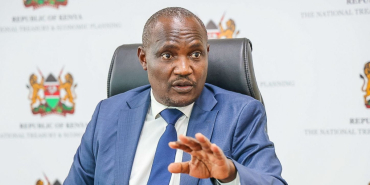Mbadi to Present 2025/2026 Budget

Treasury Cabinet Secretary John Mbadi is scheduled to address Parliament this afternoon, unveiling the government's budget estimates and revenue-raising strategies for the 2025/2026 financial year.
Mbadi, a seasoned politician with 15 years of legislative experience, now transitions into his role as the nation's chief fiscal strategist. His address follows a year marked by significant public unrest over the Finance Bill 2024, which ultimately led to President William Ruto's rejection of the legislation. Unlike its predecessor, this year's financial plan has garnered a largely positive reception from diverse stakeholders. Mbadi attributes this shift to an extensive public engagement initiative, which he asserts has shaped the government's approach and prioritised the avoidance of additional tax burdens on Kenyan citizens.
Public Engagement as a Cornerstone of Fiscal Policy
Mbadi has underscored the critical role of direct public engagement in shaping financial policy. As Treasury CS, he actively participated in public forums, barazas, and media discussions, providing a platform for Kenyans to voice their concerns. According to Mbadi, these interactions have demonstrated that effective communication can dispel misinformation and foster a deeper understanding of budget proposals.
"Sometimes people oppose measures simply because they don't understand their purpose," Mbadi says. "When you engage and explain, not only do they see the logic, but they also contribute valuable insights that help improve policies."
The administration seeks to avoid the widespread unrest that characterised the previous year by prioritising dialogue over unilateral decision-making. Mbadi's has participated in public discussions, notably through vernacular radio and television appearances, in a bid to address public scepticism and clarify misconceptions surrounding the budget.
Concerns Over Data Access and Tax Compliance
Despite the generally favourable reception, concerns remain regarding certain aspects of the budget. A contentious proposal seeks to grant the Kenya Revenue Authority (KRA) access to business and personal data through integrated systems, an initiative the government argues is essential for improving tax compliance and curbing evasion. Mbadi defends the initiative, emphasising the need for more efficient tax collection mechanisms and accountability for tax evaders.
"Why should salaried individuals bear the burden of taxation while others evade it entirely?" he questioned, reinforcing the necessity for enhanced oversight.
Critics, including financial experts and business representatives, caution that such broad access to personal and business data could be misused by the Executive. While the proposal aims to bolster tax collection, concerns persist regarding the safeguarding of personal information against potential misuse.
Reforming KRA for Improved Tax Collection
Mbadi has consistently advocated for structural reforms within the KRA, citing systemic inefficiencies that contribute to significant revenue losses. During his vetting last year, he likened the tax authority to an underfed cow being excessively milked, suggesting that comprehensive restructuring and support are essential to enhance its revenue-generating capacity.
With tax compliance as a central priority, the government aims to streamline collection processes while ensuring fairness in taxation. The CS acknowledges that existing gaps within the KRA's framework have resulted in billions in lost revenue, underscoring the urgency of institutional reforms.
Relief for Pensioners and Private-Sector Workers
The budget includes welcome provisions, such as tax-free retirement income for pensioners, intended to alleviate financial burdens for retirees. Additionally, the government has raised tax exemption limits for per diem allowances for private-sector workers, increasing the threshold from Sh2,000 to Sh10,000.
Mbadi frames these changes as part of a broader effort to create a fiscal environment that supports economic recovery and social welfare.
"For the first time, Kenyans will witness a budget that does not impose punitive taxes," he asserts, expressing confidence that the new financial measures will contribute to economic stabilisation.
Balancing Fiscal Responsibility and Public Welfare
The government's cautious approach to taxation this year occurs amidst economic hardships fueled by high inflation and increased statutory deductions. Kenyan workers have faced mandatory levies, including a 2.75 percent deduction for the Social Health Insurance Fund and an additional 1.5 percent housing levy, significantly reducing disposable incomes. Mbadi has previously indicated that the administration is considering reducing Pay As You Earn (PAYE) rates within the next two years, offering potential relief for salaried workers.














Add new comment